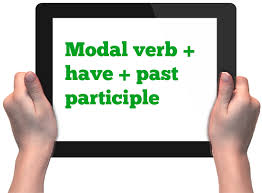Teaching grammar with the help of songs – perfect modals
What is a “perfect modal”? This is a pretty advanced grammar topic, but I’ll try to use simple explanations today. Perfect modals are not actually “perfect,” but they are called that because they use a modal verb (in this case, could, should, might/may, must) followed by a perfect tense construction (“have” + past participle). Perfect modals are used to talk about past actions.

I will try to make learning past modals more pleasant and natural with the help of popular songs, which already contain those grammar structures. Enjoy!
MUST HAVE /CAN’T HAVE …
These are used to make logical assumptions about past events, if we are 100% sure about the reasons for something that happened.
I must have left my wallet in the car ( I’m sure)
Jim can’t have noticed you. ( I’m sure he didn’t).
I. Cross the words which are not in the lyrics
It must have been our love but it’s over right now.
It must have been good and better but I lost it somehow.
It must have been love but unfortunately it’s over now.
From the very moment we touched, ’till the life time had run out.
It must have been good and better but I lost it somehow.
It must have been love but unfortunately it’s over now.
From the very moment we touched, ’till the life time had run out.
II. Find missing words
It must _________ love but it’s ______ now.
It’s all that I ______, now I’m living _____________.
It must have been love but it’s over now,
it’s where the water _____, it’s where the wind __________.
It’s all that I ______, now I’m living _____________.
It must have been love but it’s over now,
it’s where the water _____, it’s where the wind __________.
MIGHT HAVE/MAY HAVE/ COULD HAVE….
These express possibility or uncertainty about past actions
Jane might have missed the train. ( perhaps she did)
He may not have received your letter. ( perhaps he didn’t)
You could have been killed! ( it was a possibility)
”Couldn’t have said it better”
SHOULD HAVE…. /SHOULDN’T HAVE …
These express the feeling that a mistake was made. There is a criticism.
I should have posted that letter yesterday. ( I didn’t do the right thing.)
You shouldn’t have cheated during the exam. ( you were wrong to do so)


Geen reacties